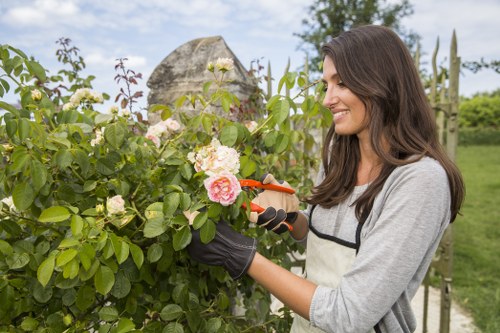Garden Maintenance in Finsbury Park

Introduction to Garden Maintenance
Maintaining a beautiful garden in Finsbury Park requires dedication, knowledge, and the right techniques. Whether you're a seasoned gardener or a novice, understanding the specific needs of your garden can make all the difference.
In Finsbury Park, the climate and soil conditions play a significant role in determining the best maintenance practices. This article provides a comprehensive overview of effective garden maintenance strategies tailored to the unique environment of Finsbury Park.
From selecting the right plants to regular upkeep routines, this guide will help you create and maintain a thriving garden that enhances the beauty of your home and provides a serene outdoor space.

Selecting the Right Plants
Understanding Finsbury Park's Climate
The first step in successful garden maintenance is choosing plants that thrive in Finsbury Park’s climate. The area experiences a temperate climate with moderate rainfall and mild winters, making it suitable for a wide variety of plants.
Consider native plants as they are well-adapted to the local conditions and require less maintenance. Plants such as lavender, rosemary, and geraniums not only beautify your garden but also attract pollinators like bees and butterflies.
Additionally, incorporating a mix of perennials and annuals ensures continuous blooms throughout the seasons, keeping your garden vibrant year-round.

Soil Preparation and Care
Healthy soil is the foundation of a flourishing garden. In Finsbury Park, the soil composition can vary, so it’s essential to test and amend it as needed.
- Soil Testing: Conduct a soil test to determine pH levels and nutrient content. This information will guide you in selecting the appropriate fertilizers and soil conditioners.
- Amending the Soil: Add organic matter such as compost or well-rotted manure to improve soil structure, drainage, and fertility.
- Mulching: Apply a layer of mulch to retain moisture, suppress weeds, and regulate soil temperature.
Regularly aerating the soil helps prevent compaction and promotes healthy root growth. Incorporate organic mulches like bark or straw to enhance soil quality over time.

Watering Techniques
Efficient Irrigation Systems
Proper watering is crucial for maintaining a healthy garden. In Finsbury Park, the rainfall is adequate, but supplemental watering may be necessary during dry spells.
- Drip Irrigation: This system delivers water directly to the plant roots, minimizing evaporation and conserving water.
- Rain Barrels: Collecting rainwater for garden use is an eco-friendly way to ensure a steady water supply.
- Automated Timers: Installing timers can help regulate watering schedules, ensuring plants receive consistent moisture.
Avoid overwatering, which can lead to root rot and other plant diseases. Check soil moisture regularly and adjust your watering practices based on the weather and plant needs.

Pruning and Trimming
Regular pruning is essential for maintaining the health and appearance of your garden. It encourages new growth, removes dead or diseased branches, and helps shape plants.
Pruning Techniques
Different plants require different pruning methods. Here are some general tips:
- Timing: Prune most plants during their dormant season to minimize stress and promote healthy growth.
- Tools: Use sharp, clean tools to make precise cuts and prevent the spread of diseases.
- Technique: Remove no more than one-third of the plant at a time to avoid excessive pruning.
Special attention should be given to shrubs and trees in your garden, ensuring they are well-maintained and free from any potential hazards.
Shaping Your Garden
Proper shaping enhances the aesthetic appeal of your garden. Consider the overall design and how each plant contributes to the landscape. Use pruning to create balanced, harmonious shapes that complement your garden’s layout.
Weed Control
Preventing and Managing Weeds
Weeds can quickly take over a garden if not managed properly. They compete with your plants for nutrients, water, and sunlight, hindering their growth.
- Manual Removal: Regularly inspect your garden and hand-pull weeds to keep them under control.
- Mulching: Applying mulch suppresses weed growth by blocking sunlight and creating a barrier.
- Organic Herbicides: Use natural weed killers to manage stubborn weeds without harming your plants.
Implementing these strategies will help maintain a weed-free garden, allowing your plants to thrive and reducing the need for chemical interventions.
Pest and Disease Management
Protecting your garden from pests and diseases is vital for maintaining plant health. In Finsbury Park, common pests include aphids, slugs, and snails.
Natural Remedies
Opt for natural pest control methods to minimize environmental impact:
- Neem Oil: This natural pesticide is effective against a variety of insects.
- Beneficial Insects: Introduce predators like ladybugs and lacewings to control pest populations.
- Handpicking: Regularly remove pests by hand to reduce their numbers.
Detecting diseases early is crucial. Look for signs such as discoloration, wilting, or unusual spots on leaves and take immediate action to prevent the spread.
Integrated Pest Management (IPM)
Adopting an IPM approach combines multiple strategies for effective pest and disease control, ensuring a healthy and sustainable garden environment.
Lawn Care
Maintaining a Healthy Lawn
The lawn is a focal point of any garden. Proper maintenance ensures it remains lush and green throughout the year.
- Mowing: Cut your grass to the recommended height to promote strong roots and prevent weed growth.
- Fertilizing: Apply appropriate fertilizers to provide essential nutrients for healthy grass.
- Aeration: Aerate the lawn to improve soil ventilation and water absorption.
Regularly inspect your lawn for signs of disease or pest infestation and take corrective measures promptly to maintain its vitality.
Seasonal Maintenance
Adapting to Seasonal Changes
Each season brings unique challenges and opportunities for garden maintenance in Finsbury Park.
- Spring: Focus on planting new flowers, pruning shrubs, and preparing beds for the growing season.
- Summer: Maintain regular watering schedules, control pests, and mulch to retain soil moisture.
- Autumn: Clean up fallen leaves, plant perennials, and prepare plants for winter.
- Winter: Protect sensitive plants, prune deciduous trees, and plan for the upcoming gardening year.
By adjusting your maintenance routines to the seasons, you ensure your garden remains healthy and vibrant all year long.
Winterizing Your Garden
Proper winter care involves protecting plants from frost, covering delicate species, and storing garden tools properly to extend their lifespan.
Garden Tools and Equipment
Essential Tools for Garden Maintenance
Having the right tools makes garden maintenance more efficient and enjoyable. Here are some essential tools every gardener in Finsbury Park should have:
- Pruning Shears: For precise trimming and shaping of plants.
- Garden Fork: Useful for aerating soil and digging.
- Watering Can or Hose: Essential for regular watering needs.
- Wheelbarrow: Helps in transporting soil, compost, and other materials.
- Gloves: Protect your hands from thorns, dirt, and potential allergens.
Investing in quality tools ensures durability and effectiveness, making your garden maintenance tasks easier and more productive.
Landscape Design Tips
Creating an Aesthetic Garden
A well-designed garden enhances the beauty of your outdoor space and provides a relaxing environment. Here are some design tips for maintaining a stunning garden in Finsbury Park:
- Balance and Symmetry: Create balanced layouts with symmetrical arrangements for a harmonious look.
- Color Coordination: Use complementary colors to make your plants and flowers stand out.
- Focal Points: Incorporate elements like statues, fountains, or unique plants to serve as focal points.
- Pathways and Borders: Define areas with pathways and borders to organize the space effectively.
Thoughtful landscape design not only improves aesthetics but also promotes a functional and enjoyable garden space.
Incorporating Hardscaping Elements
Integrate hardscaping features such as patios, decks, and pergolas to add structure and variety to your garden. These elements provide areas for relaxation and entertainment, enhancing the overall appeal.
Lighting for Your Garden
Proper lighting extends the usability of your garden into the evening hours. Use a combination of ambient, task, and accent lighting to highlight key areas and create a warm, inviting atmosphere.
Eco-Friendly Garden Practices
Sustainable Maintenance Techniques
Adopting eco-friendly practices in your garden not only benefits the environment but also promotes healthier plant growth. Here are some sustainable maintenance techniques for gardens in Finsbury Park:
- Composting: Recycle kitchen scraps and garden waste into nutrient-rich compost to improve soil fertility.
- Rainwater Harvesting: Collect and use rainwater to reduce dependency on municipal water sources.
- Organic Gardening: Avoid synthetic chemicals by using natural fertilizers and pest control methods.
- Biodiversity: Plant a diverse range of species to support local wildlife and enhance ecosystem balance.
Implementing these practices ensures a sustainable and resilient garden that contributes positively to the local environment.
Conclusion
Effective garden maintenance in Finsbury Park involves a combination of proper planning, regular upkeep, and sustainable practices. By selecting the right plants, preparing the soil, implementing efficient watering techniques, and adopting eco-friendly methods, you can create a thriving and beautiful garden.
Whether you're aiming to enhance your home's curb appeal or create a peaceful retreat, dedicated garden maintenance will help you achieve your gardening goals.
Ready to transform your garden? Contact us today to book your garden maintenance service and enjoy a lush, vibrant outdoor space all year round.

